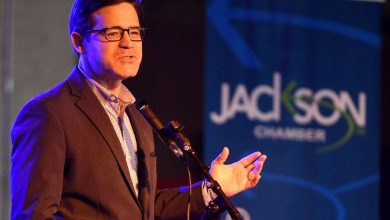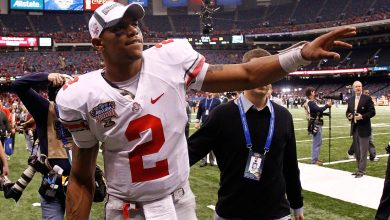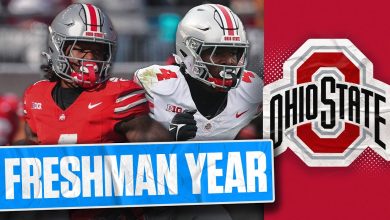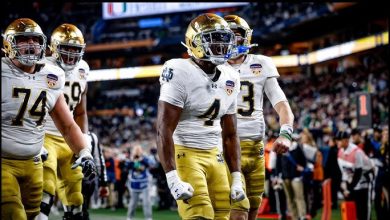Marcus Freeman’s special recruiting rules to ensure Notre Dame retains its essence in the future
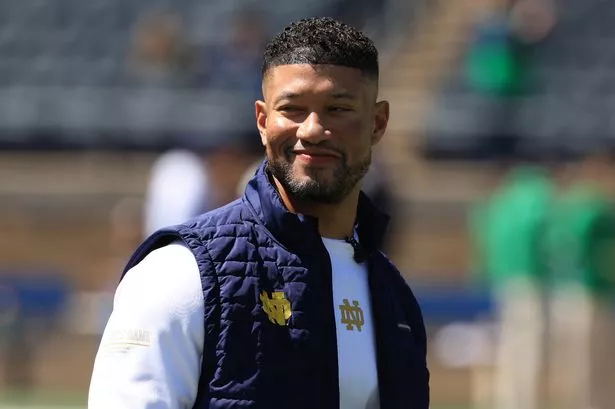
Notre Dame Football isn’t just about wins and losses. It’s about tradition, identity, values, and a culture that transcends the scoreboard. As the head coach of this storied program, Marcus Freeman has embraced a mission far more nuanced than building a successful football team — he is committed to preserving what makes Notre Dame, Notre Dame.
To do this, Freeman has implemented a unique and disciplined set of recruiting principles, which he refers to as his “special rules.” These guidelines aren’t just tactical decisions about who can run the fastest 40-yard dash or bench the most weight. They’re cultural safeguards. They ensure that the student-athletes who wear the golden helmet not only represent the university athletically, but also embody the values that have defined Notre Dame for more than a century.
Notre Dame: More Than a Football Powerhouse
To understand Freeman’s recruiting rules, it’s essential to first understand what’s at stake. Notre Dame is different. It’s a private Catholic institution located in South Bend, Indiana, that has long held itself to a higher academic, athletic, and moral standard. The university’s football program isn’t just measured by national championships (though there are plenty of those) but by the character of its athletes, their academic success, and their leadership in life after football.
The “Notre Dame Man” — a phrase often echoed by alumni and fans — is someone who excels in the classroom, on the field, and in the community. Freeman, in his recruiting strategy, has been steadfast in protecting this ideal.
Freeman’s Recruiting Philosophy: Character Over Clout
From day one, Marcus Freeman made it clear that Notre Dame wouldn’t chase stars — it would chase fit. While many college football programs obsess over 5-star ratings and social media hype, Freeman and his staff are looking deeper. Talent matters, of course. But it’s not the only thing that matters.
In an interview with ESPN, Freeman said:
“We’re not going to compromise who we are for a recruit. If a young man doesn’t want to be challenged academically, spiritually, and personally — then this probably isn’t the place for him.”
This ethos forms the basis of his special recruiting rules. Let’s dive into some of the core elements of these rules, how they differ from the norm, and why they are central to Notre Dame’s future.
Rule 1: Academic Fit Is Non-Negotiable
Notre Dame is an elite academic institution. As such, Freeman’s first rule in recruiting is to ensure that every player has the intellectual ability and the academic drive to thrive in Notre Dame’s rigorous academic environment.
There are no shortcuts. Notre Dame doesn’t use academic waivers or steer players into easier majors. Freeman works closely with the admissions office to ensure recruits understand that they are expected to earn a Notre Dame degree the same way as any other student.
Why it matters:
This rule safeguards the core identity of the student-athlete at Notre Dame. It sends a message that football is not a detour from education, but a complement to it. Freeman has even stated that during visits, he has players meet with professors and academic advisors as part of their experience.
Rule 2: Faith and Personal Growth Must Matter
While Notre Dame welcomes players of all backgrounds, faith remains a foundational pillar of the university’s identity. Freeman, a man of strong Christian faith himself, has made it clear that spiritual growth — whether through Catholic Mass, community service, or simply reflection — is part of the Notre Dame experience.
Recruits are asked to consider how faith and personal values play a role in their lives. Coaches aren’t checking for religious affiliation, but they are checking for openness to personal development.
Why it matters:
This rule helps identify players who are seeking more than a football scholarship. Freeman wants young men who are hungry to grow as people — not just as athletes.
Rule 3: Family Fit Over Football Fame
One of the most overlooked elements in recruiting is how a player’s family fits into the program’s culture. Freeman personally involves himself in getting to know the parents or guardians of every recruit. He wants families who support structure, discipline, and community involvement — not just playing time and highlight reels.
Notre Dame, under Freeman, doesn’t shy away from telling recruits that their first year might be a challenge, that they might not play right away, and that it will require grit. The families that align with that vision are the ones they want to welcome into the fold.
Why it matters:
This rule protects the locker room culture. When families understand and support the program’s long-term vision, they help prevent the kind of entitlement and conflict that can erode team chemistry.
Rule 4: Recruit the Person, Not Just the Position
Freeman and his staff do deep background checks on every recruit. Beyond watching film, they speak with high school coaches, teachers, counselors, and even custodians to understand a player’s personality, habits, and work ethic.
Does this player lead by example? How does he treat people who can’t offer him anything in return? Has he shown maturity and accountability in adversity?
This character scouting is often what breaks ties between two similarly talented athletes. If there’s even a hint of entitlement or poor behavior, Notre Dame will often pass — even if the player is a top national prospect.
Why it matters:
This rule ensures that the locker room is filled with people who can handle Notre Dame’s expectations and contribute positively to the culture. Talent can win games; character builds programs.
Rule 5: No NIL-First Recruits
One of the biggest challenges in modern college football recruiting is the rise of Name, Image, and Likeness (NIL) deals. Freeman has been clear: if a recruit’s first question is about money, Notre Dame might not be the right place for them.
Notre Dame does have a robust NIL infrastructure, and many players are successfully leveraging their brand. However, the program will not promise NIL packages to sway recruits. Freeman wants players who value education, legacy, and personal development above short-term financial gain.
Why it matters:
This rule shields the program from a transactional culture. Freeman believes that NIL should be the byproduct of hard work and performance — not the purpose of signing with a school.
Rule 6: Love and Accountability Go Hand in Hand
Freeman is known for his “love hard, coach hard” philosophy. He wants recruits who can handle both praise and tough love. During the recruiting process, his staff is transparent about the demands players will face at Notre Dame — from early morning workouts to high academic expectations.
He looks for players who respond positively to coaching, who don’t make excuses, and who want to be held accountable. He often tests this during in-home visits by asking tough questions about past mistakes or failures.
Why it matters:
This rule ensures that players can handle the demands of a high-performance environment — not just physically, but mentally and emotionally.
Looking to the Future: Recruiting with Purpose
Freeman’s recruiting rules aren’t designed to make Notre Dame’s job easier — in fact, they often make it harder. Competing for national championships while upholding high academic and character standards is no small feat in today’s college football climate.
But Freeman believes that building a team the right way is more sustainable than building it the easy way.
“We’re not just trying to win games,” Freeman said. “We’re trying to develop men who’ll make an impact — on the field, in the classroom, in their communities, and in their families.”
In Freeman’s vision, Notre Dame doesn’t need to be like everyone else to be elite. In fact, the very things that make Notre Dame different — the rigorous academics, the spiritual foundation, the culture of service and humility — are what make it great.
Marcus Freeman’s special recruiting rules are more than strategy — they’re a declaration of purpose. They reflect a commitment to preserving the essence of Notre Dame: a place where football excellence meets moral and intellectual growth, where players are measured by character as well as skill, and where success is defined not just by wins but by legacy.
By staying true to these principles, Freeman isn’t just recruiting football players. He’s building a brotherhood of future leaders — young men who will carry Notre Dame’s values forward into a world that desperately needs them.
In a sport increasingly driven by flash, hype, and short-term rewards, Freeman’s approach is bold, grounded, and visionary. And if Notre Dame continues to thrive under his leadership, it will be because the program never lost sight of who it was — thanks to a coach who refused to compromise its soul.



